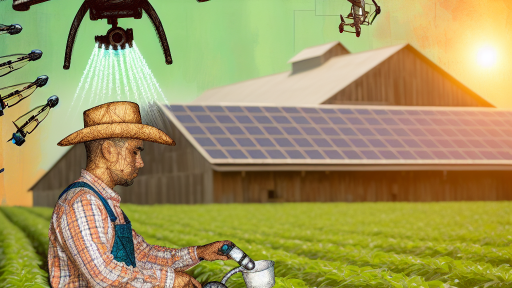Introduction to Farm Insurance
Farm insurance plays a crucial role in the agricultural sector.
It protects farmers from various risks associated with farming operations.
Understanding this insurance helps in safeguarding their investments.
Consequently, it can provide peace of mind during turbulent times.
Importance of Farm Insurance
Farm insurance is essential because it covers potential financial losses.
Unexpected events, such as natural disasters, can devastate crops.
In addition, accidents may occur on-site, resulting in significant liability expenses.
Ultimately, this insurance helps farmers recover quickly after setbacks.
Overview of Farm Insurance Options
Various farm insurance options are available to meet different needs.
Farmers can choose from policies that cover livestock, crops, and equipment.
Furthermore, liability insurance protects against lawsuits from third parties.
These options enable farmers to tailor their coverage according to their specific situations.
Crop Insurance
Crop insurance provides financial protection for farmers’ crops.
It comes in various forms, including revenue protection and yield protection.
Additionally, many farmers purchase this coverage to address unpredictable weather conditions.
Transform Your Agribusiness
Unlock your farm's potential with expert advice tailored to your needs. Get actionable steps that drive real results.
Get StartedLivestock Insurance
Livestock insurance covers losses arising from the death or injury of livestock.
This type of insurance helps farmers manage the loss of significant investments.
Moreover, it typically includes policies for specific types of animals, such as cattle or poultry.
Farm Property Insurance
Farm property insurance protects buildings and equipment used in farming.
This coverage includes barns, silos, machinery, and irrigation systems.
In the event of fire, theft, or vandalism, this insurance ensures prompt financial recovery.
Choosing the Right Farm Insurance
Selecting the appropriate farm insurance can seem overwhelming.
Farmers should assess their unique needs and risks before deciding.
Consulting with an insurance agent specializing in agricultural policies can offer insights.
Additionally, comparing quotes from multiple providers can reveal better deals.
Types of Farm Insurance
Exploring Various Policies
Farm insurance offers essential protection for agricultural operations.
Understanding the different types of coverage helps in making informed decisions.
Here, we explore various farm insurance options available to farmers.
Property Insurance
Property insurance covers physical assets related to farming activities.
This type of insurance typically includes buildings, machinery, and equipment.
Additionally, it can cover inventory such as livestock and harvested crops.
Farmers should assess the value of their assets to choose appropriate coverage.
Liability Insurance
Liability insurance protects farmers against lawsuits from third parties.
This includes coverage for bodily injury and property damage claims.
A comprehensive policy can also cover employees and visitors on the property.
Farmers should consider the risks associated with their specific operations.
Crop Insurance
Crop insurance safeguards against losses due to natural disasters.
This type of insurance provides financial protection for lost harvests.
It can cover events like droughts, floods, and pest infestations.
Showcase Your Farming Business
Publish your professional farming services profile on our blog for a one-time fee of $200 and reach a dedicated audience of farmers and agribusiness owners.
Publish Your ProfileFarmers must evaluate their crops and choose the right policy accordingly.
Livestock Insurance
Livestock insurance protects farmers from financial losses related to animals.
This insurance typically covers deaths due to accidents or diseases.
Specialized policies are available for various types of livestock.
Farmers can ensure they have adequate coverage for their specific needs.
Business Interruption Insurance
Business interruption insurance covers lost income during unforeseen events.
This can happen due to natural disasters or other extraordinary circumstances.
The policy helps farmers maintain finances while recovering from disruptions.
It’s essential for farmers to assess potential risks that may impact operations.
Specialty Insurance Policies
Some farms may require niche insurance products tailored to their industry.
This can include coverage for organic farming, agritourism, and specialty crops.
Farmers should research available specialty policies that suit their operations.
Engaging with an insurance professional can yield valuable insights.
Choosing the Right Farm Insurance
Choosing the right farm insurance involves assessing specific needs carefully.
Farmers should consider factors like location, type of farming, and risks.
Comparing multiple policies and providers can lead to better decisions.
Additionally, consulting with experts can enhance the decision-making process.
Crop Insurance: Understanding Coverage and Options
Importance of Crop Insurance
Crop insurance serves as a safety net for farmers.
It protects them against various risks that could impact their yields.
Additionally, it helps stabilize farmers’ income amid unpredictable events.
Many farmers view crop insurance as a vital component of their financial planning.
Types of Crop Insurance
Understanding the different types of crop insurance is crucial.
There are mainly two categories: “Actual Production History” (APH) and “Revenue Protection” (RP).
Each type offers specific benefits tailored to diverse needs.
Farmers should assess their situations to choose the right option.
Actual Production History (APH)
APH insurance ensures coverage based on historical yields.
This option mitigates risks when actual production falls below expected levels.
Farmers can secure a guaranteed production amount using APH.
Revenue Protection (RP)
RP insurance provides coverage based on revenue, rather than just yield.
It considers both price fluctuations and production variances.
Thus, it offers a more comprehensive safety net for farmers.
Factors Influencing Insurance Decisions
Several factors can influence a farmer’s insurance decisions.
Crop type is a significant consideration for insurance selection.
Different crops have unique risks and insurance options available.
Additionally, local climate conditions can impact choice.
Cost of Insurance
Insurance premiums vary based on crop type and coverage level.
Furthermore, premium costs can be affected by historical yields.
Farmers should evaluate their budgets when selecting coverage options.
Government Programs and Subsidies
The government offers various programs to support crop insurance.
Understanding these can help farmers reduce their costs.
Showcase Your Farming Business
Publish your professional farming services profile on our blog for a one-time fee of $200 and reach a dedicated audience of farmers and agribusiness owners.
Publish Your ProfilePrograms such as the Federal Crop Insurance program provide financial assistance.
Steps to Obtain Crop Insurance
Obtaining crop insurance involves a few key steps.
First, farmers must assess their specific needs and risks.
Next, they should research available options in their region.
Consulting with an insurance agent can also provide valuable insights.
When selecting an insurance provider, review their reputation.
A reliable provider can influence the efficiency of claims processing.
Comparing different insurance companies can uncover better coverage deals.
Submitting Claims
Farmers should be familiar with the claims process for their insurance.
This includes understanding necessary documentation and reporting timelines.
An organized approach can facilitate smoother claims management.
See Related Content: How to Create an Effective Farm Succession Plan
Livestock Insurance: Protecting Your Animals and Investments
The Importance of Livestock Insurance
Livestock insurance safeguards your agricultural investments.
It offers financial protection against the loss of animals.
Due to unforeseen events, farmers can face significant losses.
Insurance helps mitigate these risks and protects livelihoods.
Types of Livestock Insurance
There are several types of livestock insurance available.
Each type serves different needs and circumstances.
Mortality Insurance
This type covers the death of insured animals.
It compensates farmers for the market value of their livestock.
This insurance often applies to breeding animals and show livestock.
Basic Liability Insurance
Liability insurance protects against third-party claims.
It covers injuries caused by livestock to others.
This is crucial for farms with public access or events.
Medicine and Treatment Coverage
Some policies include coverage for veterinary expenses.
This can help manage unexpected medical costs.
It ensures that injured or sick animals receive needed care.
Selecting the Right Policy
Choosing the right livestock insurance involves careful consideration.
Start by assessing your specific risks and needs.
Consult with insurance agents to understand various options.
Factors to Consider
Evaluate the types of livestock you own.
Consider their value and potential risks they face.
Also, think about your financial ability to handle losses.
Comparing Different Policies
Request quotes from multiple insurance providers.
Compare coverage limits and deductibles carefully.
Review the terms and conditions of each policy.
Benefits of Livestock Insurance
Investing in livestock insurance provides multiple benefits.
It helps ensure financial stability for your farming operation.
Moreover, it reduces stress by managing unexpected losses.
Peace of Mind
Insurance offers a sense of security for farmers.
Showcase Your Farming Business
Publish your professional farming services profile on our blog for a one-time fee of $200 and reach a dedicated audience of farmers and agribusiness owners.
Publish Your ProfileKnowing you are protected allows you to focus on farming.
Long-term Financial Planning
Insurance aids in strategizing long-term investments.
It allows for better planning and resource allocation.
Delve into the Subject: Protecting Your Farm Assets with the Right Insurance
Farm Liability Insurance: Risks and Protections
Understanding Farm Liability Insurance
Farm liability insurance provides essential protection for farm operations.
This insurance covers various legal liabilities arising from farm activities.
It protects farmers against claims resulting from injuries or property damage.
Additionally, it ensures peace of mind with financial support during disputes.
Types of Risks Covered
Farm liability insurance typically covers several key risks.
- Public liability claims resulting from accidents on the farm.
- Product liability claims related to farm-produced goods.
- Environmental damage caused by farming operations.
- Employee-related claims, including injuries on the job.
Each risk category plays a vital role in the insurance coverage offered.
Key Protections Offered
Farm liability insurance delivers numerous protections to farmers.
- It covers legal fees associated with defending against claims.
- Settlement costs for successful claims are also included.
- It protects against medical expenses for injured parties.
- Personal and advertising injury coverage can be added.
Such protections significantly reduce the financial burden on farmers.
Choosing the Right Coverage
Selecting the appropriate coverage depends on specific farm activities.
Farmers should evaluate their unique risks before choosing a policy.
It is essential to consult with insurance agents to discuss options.
Moreover, comparing quotes from multiple providers is advisable.
Importance of Farm Liability Insurance
Farm liability insurance is a crucial component of farm management.
It safeguards farmers against the unpredictable nature of their business.
Ultimately, proper insurance helps in sustaining long-term farm operations.
Delve into the Subject: Crop Failure Risk Management for Farmers
Farm Property Insurance: Coverage for Buildings and Equipment
Importance of Farm Property Insurance
Farm property insurance protects your essential assets.
Your buildings and equipment are vital for daily operations.
Without proper coverage, losses can be financially devastating.
Insurance provides peace of mind to farmers.
Types of Coverage
Farm property insurance typically includes several types of coverage.
First, buildings coverage protects barns, silos, and storage facilities.
Next, equipment coverage safeguards tractors and machinery.
Additionally, this insurance may cover fences and livestock sheds.
Policyholders should assess their specific needs carefully.
Understanding Building Coverage
Building coverage insures against damages to structures.
Natural disasters like storms and floods often cause significant losses.
This coverage can also address man-made incidents like vandalism.
Regular maintenance of buildings can lower premiums.
Equipment Coverage Considerations
Equipment coverage is crucial for safeguarding your tools and machines.
Farmers should evaluate the total value of their equipment.
This coverage can include parts and accessories as well.
Regular assessments ensure adequate protection levels.
Customizing Your Policy
Each farm’s needs differ from one another.
Consulting with an insurance agent helps tailor your policy.
Agents can provide insights on optional coverages available.
Showcase Your Farming Business
Publish your professional farming services profile on our blog for a one-time fee of $200 and reach a dedicated audience of farmers and agribusiness owners.
Publish Your ProfileReviewing the policy regularly adapts to changing circumstances.
Factors Affecting Premiums
Several factors influence farm property insurance premiums.
Location plays a significant role in determining costs.
Additionally, the type of farming operations affects coverage rates.
More extensive equipment or higher building values increase premiums.
Taking safety measures can help lower costs as well.
Claim Process Overview
Understanding the claim process is essential for farmers.
First, report any loss or damage to your insurance agent promptly.
Document the damage thoroughly with photographs.
Next, provide any necessary receipts or records to support your claim.
Your agent will guide you through the next steps.
Critical Aspects of Farm Property Insurance
Farm property insurance is a critical investment for every farmer.
Understanding your coverage options enhances financial security.
Assessing your unique needs ensures comprehensive protection.
Find Out More: Seasonal Trends and Their Effects on Farming

Determining Coverage Needs
Assessing Risks on Your Farm
Assessing risks is the first step in determining your farm’s coverage needs.
Evaluate both physical and operational risks that may impact your farm.
For instance, consider natural disasters that could harm crops or livestock.
Additionally, think about potential liability issues arising from farm operations.
Recognizing these risks helps you identify necessary coverage options.
Consulting with a risk management expert can provide valuable insights.
Types of Risks to Consider
Every farm faces unique risks that require consideration.
- Weather-related risks include droughts and floods.
- Pest and disease outbreaks can threaten crops and livestock.
- Market fluctuations may affect income and profitability.
- Equipment failures can lead to costly downtime.
- Liability claims from accidents on your property can arise unexpectedly.
Understanding these risks assists in choosing the right insurance policies.
Creating a Risk Assessment Plan
A risk assessment plan allows for systematic evaluation of potential threats.
Start by identifying all assets on your farm, including buildings and livestock.
Next, rank risks based on their likelihood and potential impact.
This prioritization helps focus on the most critical areas requiring coverage.
Regularly review and update your risk assessment as conditions change.
Consulting with Insurance Professionals
Engage with an insurance agent specializing in agricultural policies.
They can help tailor a plan to suit your specific farm operations.
Ask questions about what is covered and any exclusions you should know.
Additionally, consider seeking multiple quotes to find the best options.
Professional advice ensures that you make informed decisions about coverage.
Choosing an Insurance Provider
Evaluate Your Needs
Begin by determining your specific insurance needs.
Consider the types of crops and livestock you manage.
Assess any additional risks related to your farm operations.
Research Potential Providers
Start by gathering a list of insurance companies that specialize in farm insurance.
Look for providers with positive customer reviews and ratings.
Investigate their financial stability and claim settlement ratio.
Compare Coverage Options
Different providers offer varying levels of coverage.
Showcase Your Farming Business
Publish your professional farming services profile on our blog for a one-time fee of $200 and reach a dedicated audience of farmers and agribusiness owners.
Publish Your ProfileReview the specifics of what each policy covers.
Make sure to evaluate options for natural disasters, equipment, and liability coverage.
Request Quotes
Contact multiple providers to request insurance quotes.
Be prepared to provide detailed information about your farm.
This information will help insurers give accurate quotes.
Examine Policy Terms
Before making a decision, read the policy terms thoroughly.
Look for exclusions and limitations that might affect your coverage.
Seek clarification on any terms you find confusing or unclear.
Consult with Experts
Consider speaking with an insurance agent specializing in farm insurance.
An expert can guide you through available options.
They can also assist you in understanding your coverage better.
Review the Provider’s Customer Service
Research the quality of customer service each provider offers.
Check their availability and responsiveness to inquiries.
Good customer service can make a significant difference during claims processing.
Make an Informed Decision
After gathering all this information, weigh your options carefully.
Choose the provider that aligns with your needs and budget.
Ensure that the chosen policy offers the right level of protection.
Claims Process: How to File and Manage Insurance Claims
Understanding the Claims Process
The claims process is essential for farmers with farm insurance.
It provides financial support during unexpected events.
Knowing the steps can ease stress during challenging times.
Preparing to File a Claim
Preparation is crucial before filing an insurance claim.
Gather all relevant documentation and evidence.
This may include photos, receipts, and witness statements.
Ensure you have your policy number handy as well.
Steps to File a Claim
Start by contacting your insurance provider immediately.
Notify them about the incident to initiate the claims process.
Fill out the necessary claim forms provided by your insurer.
Include accurate details about the damages or losses.
Documentation Requirements
Insurance companies require specific documentation.
- Police reports, if applicable.
- Repair estimates for damaged property.
- Farm records that outline financial losses.
Confirm you have all necessary documents ready for submission.
Managing Your Claim
After submission, monitor the status of your claim regularly.
Insurance adjusters may contact you for additional information.
Be responsive to their requests to prevent delays.
Responding to Claim Denials
Sometimes, claims may be denied by the insurance company.
If this happens, understand the reasons behind the denial.
You can appeal the decision with proper documentation.
Keep communication open with your insurance provider during this process.
Working with an Insurance Adjuster
Your insurance adjuster will investigate the claim thoroughly.
They will assess the damage and verify all information.
Ask questions to ensure you understand their findings.
Showcase Your Farming Business
Publish your professional farming services profile on our blog for a one-time fee of $200 and reach a dedicated audience of farmers and agribusiness owners.
Publish Your ProfileUsing Claim Payments Effectively
Once approved, use claim payments wisely to cover losses.
Focus on essential repairs first to restore operations.
This will help return your farming activities to normalcy.
Building Relationships with Insurance Providers
Establishing a good relationship with your insurer is beneficial.
Regular communication can lead to better service and support.
Stay informed about your policy and coverage options.
Frequently Asked Questions: Clarifying Common Farm Insurance Queries
What is Farm Insurance?
Farm insurance protects agricultural businesses from various risks.
It covers assets, equipment, and livestock against losses.
Additionally, it helps manage financial risks associated with farming operations.
Why is Farm Insurance Important?
Farm insurance is critical for safeguarding your investment.
It provides peace of mind against unexpected events.
Moreover, it ensures compliance with legal requirements.
Without it, farmers could face significant financial distress.
What Types of Coverage are Available?
Farm insurance generally includes several types of coverage.
- Property insurance covers buildings and equipment.
- Liability insurance protects against third-party claims.
- Crop insurance safeguards against crop losses.
- Livestock insurance covers losses related to farm animals.
How Do I Choose the Right Policy?
Selecting the right policy requires assessing your specific needs.
First, evaluate your farm’s assets and operational risks.
Next, compare various policies from different providers.
Consider the coverage limits and deductibles that best fit your situation.
Additionally, consult with an insurance agent for expert guidance.
Are There Discounts Available?
Many insurers offer discounts for farm insurance policies.
For instance, bundling policies can lead to savings.
Moreover, implementing safety measures may qualify you for additional discounts.
Always inquire about available discounts when shopping for policies.
Can I Adjust My Policy as My Farm Grows?
Yes, most insurance providers allow policy adjustments over time.
As your farm expands, you can increase your coverage limits.
It’s important to review your policy regularly to match your growth.
Notify your insurer about major changes to your operations.
What Should I Do After a Loss?
Reacting promptly after a loss is essential.
First, contact your insurance provider to report the claim.
Document all damages with photos and detailed notes.
Lastly, follow up with your insurance adjuster to expedite the process.




